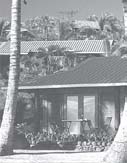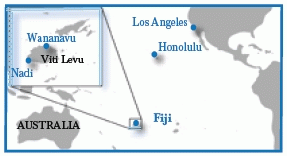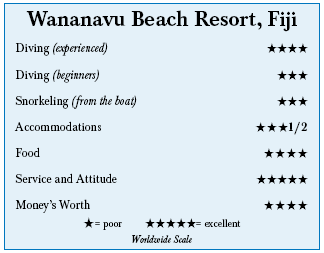Wananavu Beach Resort, FijiContents of this Issue: Is This Ascent Rate Alarm Useful? A Diver’s Tale of Somali Piracy and the Seychelles Arm Indonesia, St. Lucia, Vietnam, Hawaii . . . Aussie Liveaboard Gives Divers a Wild Ride New Divers Need to Reduce Their Weights Four Solid, Inexpensive Regulators Bahamas Bull Shark Bites Back at Irked Spearfisher Divers Survive 24 Hours in Open Waters of Gulf of Mexico Bacterial Contamination in Rinse Tanks Why You Need Trip Insurance Now Editorial Office: Ben Davison Publisher and Editor Undercurrent 3020 Bridgeway, Suite 102 Sausalito, CA 94965 great diving, although Kai Viti Divers closes its doors from the June, 2009 issue of Undercurrent
Dear Fellow Diver: Fiji’s government has been overthrown four times in the past two decades. About the most significant effect these coups have had on travelers is that a road gets closed so divers must take a detour, or a flight might be delayed. On the three-hour drive to Wananavu in February, I asked my driver what he thought of Commodore Frank Bainimarama, the military ruler who toppled the civilian government - - for the second time -- in December 2006. At the time, he had refused to hold elections until a new constitution is written, and because he is the guy writing said document, he’s in no hurry to finish it. My driver loved him. “I love what he has done to quash corruption in the government,” he said. There are no scowling soldiers, no acts of martial law, no outward signs of political disruption. Just splendid scenery above -- lush green hills interspersed with sugarcane fields running down to the azure ocean, coastal mangrove forests with passing horses, goats, and cows grazing placidly along the roadside. And splendid scenery below the waves.
Take the dive site Purple Haze, for instance. Even Jimi
Hendrix would have been in awe at
the huge wall of lush purple soft
coral as far as the eye could see. Mixed in were an abundance of sea
fans and black sun coral. A light
current made it an easy ride along
the wall without expending any
energy. In the labyrinth-cut canyon,
I counted a mass of 30 humphead
bannerfish; I’ve never seen
more than three in a group. I flew
under overhangs filled with clusters
of furry yellow sponges that
reminded me of the “tribbles” in
old episodes of Star Trek. The
overhang lifted and I was in the
sun again. At the turn-off to Wananavu, it was 15 minutes of bumpy agony down a rocky road to the resort, a cluster of 31 bures, South Pacific-style wooden bungalows either set into the lush or perched on the water’s edge. I had to climb the hill to check in at the reception office/dining area, but the queen bed in my air-conditioned bungalow downhill was worth collapsing onto afterwards. The wood floors gleamed and the tiled bathroom had plenty of hot water. The bedroom had roomy closets, fridge and minibar, but my patio with table and two chairs only had a close-up view of “jungle.” While I didn’t have to worry about Bainimarama’s army, I did fear for my life regarding dives with Kai Viti Divers, which has an on-site shop at Wananavu. That is, had an onsite shop. While it was once a first-rate operation, Kai Viti closed in May, with Ra Divers replacing them as Wananavu’s dive shop. Good thing. I didn’t dive for two days due to lung congestion, but others who did dive with Kai Viti complained of bad air in their tanks. Amazingly, the staff simply marked tanks reputed to have it and kept using the same compressor! The next day, everyone on the boat had symptoms including burning in their lungs, foul taste in their mouth and a nagging cough. When I asked the dive shop manager how the problem would be fixed, he told me the staff had finally sidelined the compressor after examination of the filter revealed a mix of oil and water. Divers were lucky not to get sick, though one man’s cough lasted for two more days. With Kai Viti having only one operating dive boat to handle two large groups, some of us were shunted off to Ra Divers, which was a blessing in disguise. Captain Bob and Divemaster Jimmy were perfect gentlemen, coming to pick us up for a ride to their shop at nearby Voli Voli Resort and helping those needing rental gear. Ra cared about its divers, divemasters were professional and its air was thankfully clean. While its boat was small, seating just eight divers, this made for a better, more intimate diving experience. However, Ben Plummer, Wananavu’s general manager, told Undercurrent later that “we have just taken delivery of a 33-foot, 315-hp aluminum dive boat for 16 passengers and four crew. It will really up the comfort level of diving the Bligh Waters.” The Bligh Waters are north of the main island of Viti Levu. Great dive sites are within 15 minutes from the dock while the more elaborate, dramatic dive sites, often washed with fairly strong currents, are 45 minutes out. Both Kai Viti and Ra Divers made two trips during my stay to Vatu-I-Ra Passage with several fantastic dive sites. Both operations dive locally for two tanks, or make going to the Passage a three-tank day, with a surcharge for the third tank. Powered by spotless twin 200hp outboards, Ra Divers’ sturdy boat ran swiftly during the 15-minute ride to Breathtaker. The large aluminum hull with canopy is comfortable on the long ride to the pinnacle site Vatu-I-Ra Passage when it isn’t bumpy. While Kai Viti allowed a giant stride entry off the back, Ra’s boat was sufficiently low to the water for easy backrolls into the 84-degree water. Visibility was not good, as the northwestern part of the island had experienced horrendous rains a few weeks before, causing massive flooding. The current was almost one knot but Jimmy headed off across coral canyons into the murky waters like a man on a mission, so we four divers followed diligently. This business of bucking current was for the birds but just when I was really starting to resent this marathon swim, Jimmy slowed, then stopped at 78 feet. He motioned me to a ledge where the reef dropped steeply and indicated I hang on to some dead coral there. Catching my breath, I looked into the blue. There were at least six sharks, a school of yardstick-long trevally, a Napoleon wrasse and masses of different fusiliers. Flashy orange and pink anthias swarmed in a huge cloud, while countless fish of all sizes, colors and groupings moved together in one huge entity. It was the Technicolor display of notes in a Mozart symphony played underwater. I would have been slack-jawed if I didn’t need to keep my regulator in my mouth. Breathtaker would have been more overwhelming if the visibility had been the typical 100-foot range instead of that day’s 60 feet. Jimmy directed us back to the boat, over and through the coral canyons. Imagine Cozumel’s swimthroughs and canyons, then quintuple them and stretch them to 50 feet high. It was like exploring a lavishly decorated castle, finding riches around every corner of bommies covered with branching corals, or through tunnels covered with sea fans and soft coral. Several sharks lazed nearby, a turtle came over to check us out, and a hefty cod snacked on small fish. During our hour of offgassing in the Bligh Waters, we had cookies and Milo, the Australian version of Ovaltine. Because Wananavu is set on a hillside, there are plenty of stairs and concrete pathways, but for most folks, crossing from the dining area down the hill to the beach and back is easy. The pool is 20 feet below the dining area; it’s lovely but the water was too warm to be refreshing and a lack of trees and shade meant I had to keep slathering on sunscreen. The dining area is partly covered and has an open deck with an expansive ocean view, perfect for sunset dinners. The meal plan includes a continental breakfast of pineapple, banana, papaya, passionfruit, and oranges alongside cereal, juices and toast. For hungrier days, I could order eggs, pancakes and French toast. Lunch and dinner are also ordered from a menu and have the added benefit of live Fijian music on guitar, ukulele and lali drums. At dinnertime, the musicians host a kava bowl (the Fijian national intoxicant, it offers but a slight buzz). The food is delicious and generous, though it was US$5 for a beer or dessert and $8 for wine. The staff, mostly locals managed by Australian couple Rachel and Ben, learned my name and what I liked to drink. Non-divers won’t be bored. Wananavu offers daily activities like snorkeling and visiting neighboring islands and villages. Evaloni, Wananavu’s wise patriarch-in-residence, mans the activities booth. Besides teaching me to play petanque, a distant cousin of horseshoes, he also gave a great class about the medicinal use of Fijian plants. I took more dive time off to go with Evaloni on a half-day tour to the town of Raki Raki, with a stop at the grave of Fiji’s last cannibal king. Back on the boat, another backroll led me down to Wedding Chapel. Compared to Breathtaker, it was like entering a movie theatre on a Wednesday afternoon. Fish were conspicuously absent, as if we were in a different ocean, but I started looking patiently for smaller stuff. Sure enough, what Wedding Chapel lacked in fish life it more than made up for in legions of healthy Acropora and Sarcophyton species of coral along the canyon floor at 56 feet. Not to be outdone, the canyon walls were decorated with a rainbow’s array of sea fans, whip corals, black sun coral, and stony Turbinaria species. I’d never seen so many hard corals with polyps actively deployed and fanning the current-driven water for lunch. Other sites also lacked hordes of fish, but that made it easier to focus on more
delicate sea life. I liked to examine crinoids to find tiny crabs that sometimes live in the center where their arms meet.
At Wedding Chapel, I found a pair
of one-inch green commensal shrimp
instead. Another bonus is that every site has reefs close enough to the surface so that safety stops could be spent getting last looks at the colorful coral communities. I was efficient on air so after 80-minute dives, Jimmy let me stay under the boat after the others had surfaced to enjoy the uppermost peaks of bommies in solitude. Then I surfaced at the stern and handed up my weight belt, BC and fins. Ra Divers had a helpful “hand hold” between the outboard motors at the top of the ladder. Mounted on the transom, it gave me something more to grasp than just the ladder itself, making that last pull up to the rear platform very easy. By the way, Bainimarama’s reign as Prime Minister briefly came to a halt in mid-April when Fijian judges determined his regime illegal, but a day later, Fiji’s president sacked the judges and reinstalled Bainimarama. The coups are as peaceful as the dives but Fiji is indeed in flux. While my driver is a native Fijian, the Indian residents, who run most of the businesses and make up 38 percent of the population, are being hassled. Australia and New Zealand are threatening trade sanctions if democracy isn’t restored. Still, if the locals don’t seem bothered about who’s handling government, visiting divers don’t need to be either. -- V.B.H.
|

I want to get all the stories! Tell me how I can become an Undercurrent Online Member and get online access to all the articles of Undercurrent as well as thousands of first hand reports on dive operations world-wide
| Home | Online Members Area | My Account |
Login
|
Join
|
| Travel Index |
Dive Resort & Liveaboard Reviews
|
Featured Reports
|
Recent
Issues
|
Back Issues
|
|
Dive Gear
Index
|
Health/Safety Index
|
Environment & Misc.
Index
|
Seasonal Planner
|
Blogs
|
Free Articles
|
Book Picks
|
News
|
|
Special Offers
|
RSS
|
FAQ
|
About Us
|
Contact Us
|
Links
|
3020 Bridgeway, Ste 102, Sausalito, Ca 94965
All rights reserved.


 This was a 62-foot dive
in as many catch-your-breath minutes and luckily the most thrills I experienced
in a coup-ridden country.
This was a 62-foot dive
in as many catch-your-breath minutes and luckily the most thrills I experienced
in a coup-ridden country. The Bligh Waters featured a
mass of crinoids in many colors. At
Wedding Chapel, an 18-inch fan coral
had eight large ones on its top edge,
strategically placed to catch grub
coming their way on the current.
The Bligh Waters featured a
mass of crinoids in many colors. At
Wedding Chapel, an 18-inch fan coral
had eight large ones on its top edge,
strategically placed to catch grub
coming their way on the current. Diver’s Compass: A seven-night package, all food included, with five
two-tank dive days on Ra Divers’ boat is running around US$975 . . .
The dive trip to Vatu-I-Ra Passage is a 45-minute ride and costs $75
extra but involves three dives instead of two . . . Direct flights on
Fiji’s main carrier Air Pacific (
Diver’s Compass: A seven-night package, all food included, with five
two-tank dive days on Ra Divers’ boat is running around US$975 . . .
The dive trip to Vatu-I-Ra Passage is a 45-minute ride and costs $75
extra but involves three dives instead of two . . . Direct flights on
Fiji’s main carrier Air Pacific (